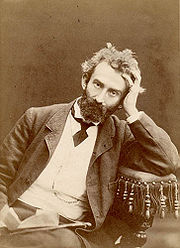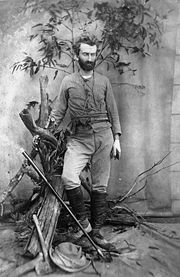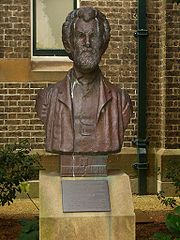
Nicholai Miklukho-Maklai
Encyclopedia

Ukrainian language
Ukrainian is a language of the East Slavic subgroup of the Slavic languages. It is the official state language of Ukraine. Written Ukrainian uses a variant of the Cyrillic alphabet....
; sometimes referred to as Nicolai Nicolaevich de Miklouho-Maclay) (1846–1888) was a Russia
Russia
Russia or , officially known as both Russia and the Russian Federation , is a country in northern Eurasia. It is a federal semi-presidential republic, comprising 83 federal subjects...
n ethnologist
Ethnology
Ethnology is the branch of anthropology that compares and analyzes the origins, distribution, technology, religion, language, and social structure of the ethnic, racial, and/or national divisions of humanity.-Scientific discipline:Compared to ethnography, the study of single groups through direct...
, anthropologist and biologist
Biologist
A biologist is a scientist devoted to and producing results in biology through the study of life. Typically biologists study organisms and their relationship to their environment. Biologists involved in basic research attempt to discover underlying mechanisms that govern how organisms work...
of Ukrainian
Ukrainians
Ukrainians are an East Slavic ethnic group native to Ukraine, which is the sixth-largest nation in Europe. The Constitution of Ukraine applies the term 'Ukrainians' to all its citizens...
, German
Germans
The Germans are a Germanic ethnic group native to Central Europe. The English term Germans has referred to the German-speaking population of the Holy Roman Empire since the Late Middle Ages....
and Polish
Poles
thumb|right|180px|The state flag of [[Poland]] as used by Polish government and diplomatic authoritiesThe Polish people, or Poles , are a nation indigenous to Poland. They are united by the Polish language, which belongs to the historical Lechitic subgroup of West Slavic languages of Central Europe...
descent.
Ancestry and early years
Miklouho-Maclay was born in a temporary workers camp near Novgorod in Imperial RussiaRussian Empire
The Russian Empire was a state that existed from 1721 until the Russian Revolution of 1917. It was the successor to the Tsardom of Russia and the predecessor of the Soviet Union...
, a son of a civil engineer
Civil engineer
A civil engineer is a person who practices civil engineering; the application of planning, designing, constructing, maintaining, and operating infrastructures while protecting the public and environmental health, as well as improving existing infrastructures that have been neglected.Originally, a...
working on the construction of the Moscow-Saint Petersburg Railway
Moscow-Saint Petersburg Railway
The Moscow to Saint Petersburg Railway is a railway running between the two largest Russian cities of Moscow and Saint Petersburg, and through four oblasts: Moscow, Tver, Novgorod and Leningrad...
. His Ukrainian father was descended from Stepan Myklukha, a Zaporozhian Cossack, who was awarded the title of noble
Nobility
Nobility is a social class which possesses more acknowledged privileges or eminence than members of most other classes in a society, membership therein typically being hereditary. The privileges associated with nobility may constitute substantial advantages over or relative to non-nobles, or may be...
of the Empire by Catherine II
Catherine II of Russia
Catherine II, also known as Catherine the Great , Empress of Russia, was born in Stettin, Pomerania, Prussia on as Sophie Friederike Auguste von Anhalt-Zerbst-Dornburg...
for his military exploits during the Russo-Turkish War (1787–1792), which included the capture of the Ochakov fortress. His mother, Ekaterina Semenovna, née Bekker, was of Polish-German descent (her three brothers took part in the January Uprising
January Uprising
The January Uprising was an uprising in the former Polish-Lithuanian Commonwealth against the Russian Empire...
of 1863). Nicholas attended a grammar school in Saint Petersburg
Saint Petersburg
Saint Petersburg is a city and a federal subject of Russia located on the Neva River at the head of the Gulf of Finland on the Baltic Sea...
, then went on to study at St. Petersburg University. After 1873, the Miklouho-Maclay family owned a country estate in Malyn
Malyn
Malyn is a city in Zhytomyr Oblast of Ukraine located about 65 miles northwest of Kiev. Population is 28,113 ....
, 150 kilometres (93.2 mi) northwest of Kiev
Kiev
Kiev or Kyiv is the capital and the largest city of Ukraine, located in the north central part of the country on the Dnieper River. The population as of the 2001 census was 2,611,300. However, higher numbers have been cited in the press....
.
He travelled and studied widely in Europe
Europe
Europe is, by convention, one of the world's seven continents. Comprising the westernmost peninsula of Eurasia, Europe is generally 'divided' from Asia to its east by the watershed divides of the Ural and Caucasus Mountains, the Ural River, the Caspian and Black Seas, and the waterways connecting...
, was for a time a student of Ernst Haeckel
Ernst Haeckel
The "European War" became known as "The Great War", and it was not until 1920, in the book "The First World War 1914-1918" by Charles à Court Repington, that the term "First World War" was used as the official name for the conflict.-Research:...
, and became a close friend of the biologist Anton Dohrn
Anton Dohrn
Felix Anton Dohrn was a prominent German Darwinist and the founder and first director of the Stazione Zoologica, Naples, Italy.-Family history:...
, with whom he helped conceive the idea of research station
Research station
A research station is a station built for the purpose of conducting scientific research. Research station sites might include outer space and oceans. Many nations have research stations in Antarctica; Showa Station, Halley and Troll are examples...
s while staying with him at Messina, Italy
Italy
Italy , officially the Italian Republic languages]] under the European Charter for Regional or Minority Languages. In each of these, Italy's official name is as follows:;;;;;;;;), is a unitary parliamentary republic in South-Central Europe. To the north it borders France, Switzerland, Austria and...
.
Australia

Australia
Australia , officially the Commonwealth of Australia, is a country in the Southern Hemisphere comprising the mainland of the Australian continent, the island of Tasmania, and numerous smaller islands in the Indian and Pacific Oceans. It is the world's sixth-largest country by total area...
on the steam corvette Vityaz. He arrived in Sydney
Sydney
Sydney is the most populous city in Australia and the state capital of New South Wales. Sydney is located on Australia's south-east coast of the Tasman Sea. As of June 2010, the greater metropolitan area had an approximate population of 4.6 million people...
on 18 July 1878. A few days after arriving, he approached the Linnean Society and offered to organise a zoological centre. In September 1878 his offer was approved. The centre, known as the Marine Biological Station, was constructed by prominent Sydney architect
Architect
An architect is a person trained in the planning, design and oversight of the construction of buildings. To practice architecture means to offer or render services in connection with the design and construction of a building, or group of buildings and the space within the site surrounding the...
, John Kirkpatrick. This facility, located in Watsons Bay on the east side of the Greater Sydney, was the first marine biological research institute in Australia. He married Margaret-Emma Robertson, daughter of the Premier of New South Wales, John Robertson.
He visited north-eastern New Guinea
New Guinea
New Guinea is the world's second largest island, after Greenland, covering a land area of 786,000 km2. Located in the southwest Pacific Ocean, it lies geographically to the east of the Malay Archipelago, with which it is sometimes included as part of a greater Indo-Australian Archipelago...
, Philippines
Philippines
The Philippines , officially known as the Republic of the Philippines , is a country in Southeast Asia in the western Pacific Ocean. To its north across the Luzon Strait lies Taiwan. West across the South China Sea sits Vietnam...
and Indonesia
Indonesia
Indonesia , officially the Republic of Indonesia , is a country in Southeast Asia and Oceania. Indonesia is an archipelago comprising approximately 13,000 islands. It has 33 provinces with over 238 million people, and is the world's fourth most populous country. Indonesia is a republic, with an...
on a number of occasions, and lived amongst the native tribes, writing a comprehensive treatise on their way of life and customs.
Opposition to the slave trade
One of the earliest followers of Charles DarwinCharles Darwin
Charles Robert Darwin FRS was an English naturalist. He established that all species of life have descended over time from common ancestry, and proposed the scientific theory that this branching pattern of evolution resulted from a process that he called natural selection.He published his theory...
, Miklouho-Maclay is probably best remembered today as a humanist
Humanism
Humanism is an approach in study, philosophy, world view or practice that focuses on human values and concerns. In philosophy and social science, humanism is a perspective which affirms some notion of human nature, and is contrasted with anti-humanism....
scholar who, on the basis of comparative anatomical research, was the first in Russian anthropology to refute the prevailing view that the different 'races' of mankind belonged to different species.
He was also opposed to the slave trade
History of slavery
The history of slavery covers slave systems in historical perspective in which one human being is legally the property of another, can be bought or sold, is not allowed to escape and must work for the owner without any choice involved...
. In November 1878 the Dutch government informed him that on his recommendations it was checking the slave traffic at Ternate and Tidore. From 1879 onwards he wrote to Sir Arthur Gordon, high commissioner for the Western Pacific, on protecting the land rights of his friends on the Maclay Coast, and ending the traffic in arms and intoxicants in the South Pacific.
Ill-health and death in Russia
In 1887 he left Australia and returned to St Petersburg to present his work to the Russian Geographical SocietyRussian Geographical Society
The Russian Geographical Society is a learned society, founded on 6 August 1845 in Saint Petersburg, Russia.-Imperial Geographical Society:Prior to the Russian Revolution of 1917, it was known as the Imperial Russian Geographical Society....
, taking his young family with him. Miklouho-Maclay was in poor health at this time and it was a trip from which he did not return. Despite treatment from Sergei Botkin
Sergei Botkin
-External links:* *...
, Miklouho-Maclay died of an undiagnosed brain tumour, aged 42, in St Petersburg. He was buried in the Volkovo cemetery, and left his skull to the St. Petersburg Military and Medical Academy.
Post-death

Alexander III of Russia
Alexander Alexandrovich Romanov , historically remembered as Alexander III or Alexander the Peacemaker reigned as Emperor of Russia from until his death on .-Disposition:...
and then by Nicholas II
Nicholas II of Russia
Nicholas II was the last Emperor of Russia, Grand Prince of Finland, and titular King of Poland. His official short title was Nicholas II, Emperor and Autocrat of All the Russias and he is known as Saint Nicholas the Passion-Bearer by the Russian Orthodox Church.Nicholas II ruled from 1894 until...
. One of his sons, Alexander, married a daughter of R. E. O'Connor.
Miklouho-Maclay's name is commemorated in many parts of the world. In Australia, the building of the Marine Biological Station was commandeered by the Ministry of Defence in 1899 as a barracks
Barracks
Barracks are specialised buildings for permanent military accommodation; the word may apply to separate housing blocks or to complete complexes. Their main object is to separate soldiers from the civilian population and reinforce discipline, training and esprit de corps. They were sometimes called...
for officer
Officer (armed forces)
An officer is a member of an armed force or uniformed service who holds a position of authority. Commissioned officers derive authority directly from a sovereign power and, as such, hold a commission charging them with the duties and responsibilities of a specific office or position...
s. However, the Miklouho-Maclay Society lobbied for the centre to be made into a historical landmark in memory of Miklouho-Maclay's scientific work, as well as for a park to be named in his honour. A bust of Miklouho-Maclay was unveiled at Sydney University near the Macleay Museum to commemorate 100 years of his death. A de Miklouho-Maclay Prize for Excellence in Chemistry is awarded each year in the National Titration Competition in New South Wales
New South Wales
New South Wales is a state of :Australia, located in the east of the country. It is bordered by Queensland, Victoria and South Australia to the north, south and west respectively. To the east, the state is bordered by the Tasman Sea, which forms part of the Pacific Ocean. New South Wales...
, Australia.
The Maclay Coast, which Miklouho-Maclay named, is still used as the name for the North-east coast of Papua New Guinea
Papua New Guinea
Papua New Guinea , officially the Independent State of Papua New Guinea, is a country in Oceania, occupying the eastern half of the island of New Guinea and numerous offshore islands...
. In Madang
Madang
Madang is the capital of Madang Province and is a town with a population of 27,420 on the north coast of Papua New Guinea. It was first settled by the Germans in the 19th century....
, Papua New Guinea — not far from where the explorer stayed in the 1870s — a street has been named after him. He is also commemorated in the plant species Pouteria
Pouteria
Pouteria is a genus of flowering trees in the gutta-percha family, Sapotaceae. The genus is widespread throughout the tropical regions of the world. It includes the Canistel , the Mamey Sapote and the Lúcuma...
maclayana.
In Russia there is an Institute of Ethnology and Anthropology and a street in South-West Moscow (where the Peoples' Friendship University of Russia
Peoples' Friendship University of Russia
The Peoples' Friendship University of Russia is an educational and research institution located in the South of Moscow and is ranked by the Ministry of Education of Russia as the country's third-best university after Moscow State University and Saint Petersburg State University...
is situated) named in his honor.
External links
- Maclay Coast, Papua New Guinea on Google Maps.

